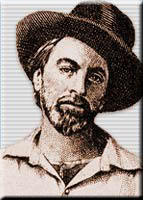
Walt Whitman
Born 1819  Died 1892
Died 1892
Walt Whitman was born in West Hills, New York, on May 31st, 1819 to Walter Whitman and Louisa Van Velsor. He was the second of nine children. His family moved to Brooklyn when he was very young, where he spent most of his childhood and attended only six years of public school. To keep up his education after his public schooling ended, Whitman visited libraries and museums and attended lectures. He got his first job at the age of eleven as an office boy for some prominent lawyers in Brooklyn. He continued to educate himself, studying a trade as a printer, and loved to read.
In 1833, Whitman's family moved back to West Hills, leaving the 14-year-old boy living in Brooklyn alone. He worked as a printer for several years until a great fire demolished the printing industry. In 1836, he began working as a teacher in a one-room school house in Long Island. He spent what he believes to be five of the worst years of his life teaching dull and unenlightened students of varying ages.
In 1841, Whitman retired from teaching to return to journalism. He founded a newspaper, the Long Islander, which stayed in print for only a year before going under. He returned to teaching for two more years, but gave it up again, this time to write fiction.
Whitman worked for several newspapers over the next few years, and was editor of the Brooklyn Daily Eagle from 1846 to 1848. He was fired over political disagreements with the owner. He moved to New Orleans and became the editor of the New Orleans Crescent. This job lasted for only three months until he left due to a "singular sort of coldness" from the owners, which was due to his dislike of slave trade. He continued his self-education, moving heavily into poetry. His poetry became less unoriginal as he worked on it. His first collected works, Leaves of Grass, was published in 1855. He sent a copy to Raplh Waldo Emerson, who had become very interested in Whitman's poetry. He published a second, much longer edition of Leaves in 1856, which included a letter from Emerson remarking on the first edition. A week after the first edition was published, Walter Whitman Sr. died. Whitman became the major male role model for his family. He published several more books in the decades to come.
In 1862, Whitman's brother George was injured in the Civil War. Whitman immedialtely set out on a search for his brother. Upon finding him, he discovered that George only had a superficial facial wound, however, the gory scene Whitman was met with would influence his poetry for years to come. He stayed in Fredericksburg to care for the battle-wounded, then moved to Washington D.C. He stayed caring for soldiers in D.C. until 1864, when he moved to Virginia for a few months. When he became very ill, he was sent back to Brooklyn to rest. During these few months, he visited wounded soldiers in hospitals in New York. He moved back to D.C. shortly thereafter. His second book, Drum-Taps, was published in 1865, very shortly after Abraham Lincoln was assassinated.
Shortly after the war ended, Whitman met a confederate soldier named Peter Doyle, whom he developed feelings for. Eventually the two men grew apart, but continued to keep in contact.
Later that year, Whitman was fired from his government job and got another in the office of the Attorney General. He kept his new job for eight years before suffering a stroke in January 1873, which left him partially paralyzed. A year later, he quit due to his degrading health. His mother had died shortly beforehand in Camden, New Jersey, where he had decided to stay in his retirement.
Walt Whitman published several more books in the ensuing years and died on March 26th, 1892, in Camden, New Jersey, and was buried in a large tomb in the same city. Several of his family members joined him in that tomb after their deaths or were relocated to it. He was 73 years old at the time of his death.
Biography by Prettyleia
Submitted 04.30.04
Modern American Poetry - About Walt Whitman
Harry Ransom Humanities Research Center - Walt Whitman, Biographical Sketch
Bibliography
PoetryLeaves of Grass (1855) First edition.
Leaves of Grass (1856) Second edition.
Leaves of Grass (1860) Third edition.
Drum Taps (1865)
Sequel to Drum Taps (1865)
Leaves of Grass (1867) Fourth edition.
Leaves of Grass (1870) Fifth edition.
Passage to India (1870)
Leaves of Grass (1876) Centennial edition.
Leaves of Grass (1881) Sixth edition.
Leaves of Grass (1891) "Deathbed" edition.
Good-Bye, My Fancy (1891)
Prose
Franklin Evans; or, The Inebriate (1842)
Democratic Vistas (1871)
Memoranda During the War (1875)
Specimen Days and Collect (1881)
November Boughs (1888)
Complete Prose Works (1892)